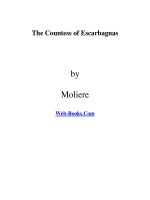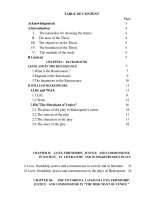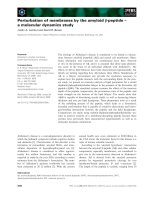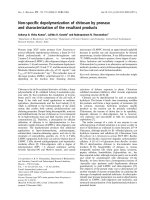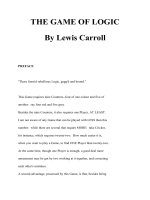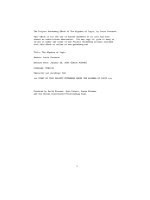The Restatement of Conflict of Laws by the American Law Institute
Bạn đang xem bản rút gọn của tài liệu. Xem và tải ngay bản đầy đủ của tài liệu tại đây (829.64 KB, 11 trang )
Volume 35
Issue 2
Article 8
February 1929
The Restatement of Conflict of Laws by the American Law
Institute as Affecting West Virginia
Edmund C. Dickinson
West Virginia University College of Law
Follow this and additional works at: />Part of the Conflict of Laws Commons
Recommended Citation
Edmund C. Dickinson, The Restatement of Conflict of Laws by the American Law Institute as Affecting
West Virginia, 35 W. Va. L. Rev. (1929).
Available at: />
This Editorial Note is brought to you for free and open access by the WVU College of Law at The Research
Repository @ WVU. It has been accepted for inclusion in West Virginia Law Review by an authorized editor of The
Research Repository @ WVU. For more information, please contact
Dickinson: The Restatement of Conflict of Laws by the American Law Institute
WEST VIRGINIA LAW QUARTERLY
free hand until Congress has seen fit to act.2" It is doubtful if
this would meet the situation. It could at most only eliminate
the interstate anarchy at present existing and would not touch the
vital economic principle involved of the contest between different
modes of travel. Forty-eight states could conceivably have fortyeight different solutions, which could only serve to make the tangle
worse.
Economically considered the railroads are national institutions
and the ever-increasing net-work of highways is rapidly making
the automobile carriers the same and the states in the natural
scheme of things can have little to do with their regulation, which
must be from a common source in a uniform manner.
The days of free competition in public utilities are over; neither
the State nor the Federal government can stand idly by and
permit a kmock-down-and-drag-out fight between motor transportation and the railroads.
If Congress, profiting by the efforts of the states, would
inaugurate a system of Federal Control within the Federal field
of jurisdiction, the states could follow this up with legislation by
modeling intra-state control along the national lines thus laid
down, in the same fashion as the State Public Service Commissions
follow the head of the Interstate Commerce Commission in matters
jointly affecting state and nation. Unless something is done
nationally, the regulation of motor busses is, potentially at least,
at a standstill.
-JAY T. MoOaumc.*
Reynolds, Bush
23 See dissenting opinion of Mr. Justice
Buck v. Kuykeadall, 267 U. S. 325, 45 Sup. Ct. 327 (1025).
*Member of the Wheeling, West Virginia, Bar.
THE RESTATIMENT
v.
Maloy,
OF CONFICT OF L.WS BY THE AMERIcAN
LAW INSTITUTE AS AFFECTING WEST VmGINIA-It
is entirely
unnecessary to preface this discussion with a statement concerning
the work of the American Law Institute or the method by which
the work of that distinguished body is carried on. This Association on previous occasions has been quite fully informed on these
subjects by two gentlemen preeminently qualified to discuss themMr. William Draper Lewis, the able director of the Institute, and
Mr. Herbert F. Goodrich, who has recently been made its Adviser
on Pxofessional and Public Relations. The creation of this latter
office emphasizes the importance that is now conceded to the second
*An address delivered at the last annual meeting of tho West Virginia
Bar Association held in Fairmont, W. Va.
Disseminated by The Research Repository @ WVU, 1929
1
West Virginia Law Review, Vol. 35, Iss. 2 [1929], Art. 8
EDITORIAL NOTES
task before the Institute. The first is to restate the Common
Law; the second is to make this restatement known to lawyers and
judges throughout the country so that it may be used and relied
upon by all the profession.
One of the means employed for accomplishing this latter purpose
has been the appointment of committees by State Bar Associations
to cooperate with the American Law Institute. Members of these
Committees have been asked to study the Tentative Drafts of the
Restatement and send in suggestions for their improvement and
also to spread information about the Institute and its progress.
At a Conference of Bar Association Co-operating Committees held
last October "to discuss plans for the widest possible distribution
and use of the Tentative and Final Drafts of the Restatements,"
a definite plan was presented by the Michigan delegates which led
to the adoption of the following resolution:
Resolved: (1) That this Conference suggest to state bar
associations that they try by way of experiment, the preparation and publication by state bar associations of editions of
the Restatements embodying local annotations.
(2) Such annotations should cite all relevant local decisions and statutes and indicate their agreement or disagreement with the rules of law as stated in the Restatement.
They should also indicate those instances in which there is
no local authority.
(3) It is further recommended that the person or persons
to prepare such local annotations be chosen by the respective
Committees on Cooperation with the American Law Institute
as officers or governing boards of such associations, and that
the work done be under the supervision of these committees
with the co-operation and advice of the American Law Institute.
(4) We further recommend that annotated editions of the
Restatements be published by the state bar associations, and
that copies thereof be sent without individual expense to all
members of such associations.
"The fundamental idea underlying the plan," Mr. Lewis tells
us, "is that the judge or lawyer in his work on the bench or at
the bar, with every disposition to use and rely on the Restatement,
will not and should not ignore the Statutes of his state nor the
decisions of its highest court, and that, thefefore, that which will
best promote the use of, and reliance upon, the Restatement is
anything which will give him with the Restatement authoritative
information concerning the pertinent statutes and decisions of his
/>
2
Dickinson: The Restatement of Conflict of Laws by the American Law Institute
WEST VIRGINIA LAW QUARTERLY
state." A Supreme Court Judge who attended the Conference
put it this way:
"I have sufficient confidence in the way these Restatements
are being produced to rely on them as statements of the
general common law of the United States. In the absence of
local statutes and decisions I am willing to follow the Restatement, but before deciding the instant case I must know
if there is any pertinent state statute or whether my court
has passed on the question and, if so, what the decision has
been."
Since this Conference the Michigan Bar Association has completed annotations of the first three tentative drafts of the Restatement of Conflict of Laws, and similar annotations are being
prepared in Wisconsin, New York, Pennsylvania, Illinois and
Iowa, and beginnings have been made in other states.
As a part of the Research program of our law school, we have
undertaken during the past summer the annotation of the restatements of two subjects-Conflict of Laws and Agency. The primary purpose of this work is to make the Restatement of greater
value to the lawyers and judges of this state. Just as a statute is
illumined by reference to the cases in which it has been construed,
so should the generalizations of the restatement be more readily
understood when compared with our own decisions and statutes.
This ought to lead to a more general use of the restatement, which,
of course, is essential to the success of the work of the Institute.
Incidentally, work of this nature is exceedingly valuable to the
man who does it. If he doesn't know his subject after the research and study required in this work he may as well abandon
hope of ever knowing it. Also the close study involved may disclose inaccuracies or omissions in the Restatement which may be
corrected if called to the attention of the Institute.
This work, of course, is still in the experimental stage. Not only
are the form and scope of the annotations determined entirely by
the individual annotator, but methods devised for getting his
product into the hands of the profession and for keeping the
annotations up to date may differ widely. In preparing the West
Virginia annotations of the Restatement on Conflict of Laws I have
followed the plan adopted in the lichigan Anotated Restatement
of that subject. Under each section of the Restatement the pertinent statutes and decisions will be cited and perhaps discussed
briefly, indicating their agreement or disagreement with the Restatement. If nothing relevant has been found, that fact will be
indicated. In gathering materials it was thought best not to rely
Disseminated by The Research Repository @ WVU, 1929
3
West Virginia Law Review, Vol. 35, Iss. 2 [1929], Art. 8
EDITORIAL NOTES
apon the digests. A page by page examination of West Virginia
reports disclosed between three and four hundred cases in which
Conflict of Laws questions have been decided or at least discussed,
as against the thirty cases cited in the only digest of West Virginia reports which group the cases under this general head. This
preliminary work consumed so much of the time available that
only a small portion of the actual annotating was completed. With
the materials gathered, progress should now be fairly rapid. It is
expected that the last chapters of the Restatement of Conflict of
Laws will be completed before the next meeting of the Institute
and that the final draft will be presented for approval in 1930.
The West Virginia annotations of the Restatement of Conflict of
Laws and perhaps of Agency should be ready for publication
within the next year. It is hoped that by that time some plan will
have been worked out by the Law School and this Association for
their publication and distribution.
It should be evident from what I have stated that I am not at
the present time in a position to discuss adequately the topic which
your committee has assigned me. Just how the Restatement of
Conflict of Laws will affect West Virginia depends on two things:
(1) the extent to which its rules differ from those of our own
decisions and statutes; and (2) the extent to which our judges
use and rely upon it.
Until the work of annotating the entire Restatement of Conflict
of Laws is completed it would not be possible for me to point out
all the instances of disagreement between it and our own decisions.
I shall discuss briefly, however, a few points of difference which
a cursory examination of cases for the purpose of classification has
revealed.
The introductory chapter of the Restatement contains little
except descriptive sections. Section 5 however, may lead to the
abandonment of such expressions as "rules of comity" or "law of
comity," which we find not infrequently in our decisions. That
section says: "The Conflict of Laws is a part of the common law.
The Conflict of Laws of a particular state, like other parts of the
law, is subject to change by constitutional or statutory provisions
or by treaties; but in so far as it has not been changed, it is as
binding on the courts as any other parts of its law." Our court
meant the same, no doubt, in Floyd v. Loan & Investment Company,1 when it said, "But this rule of comity exists and is enforced by the courts in every nation and every state of the Union,
The danger in the
until destroyed by the law making power."
use of the word "comity" lies in the fact that it may indicate that
1 49 W. Va. 327, 38 S. E. 653 (1901).
/>
4
Dickinson: The Restatement of Conflict of Laws by the American Law Institute
WEST VIRGINIA LAW QUARTERLY
conflict of laws rules are discretionary with the court. For
instance in Stevens v. Broumn2 our court says: "The courts of
this state will not, through respect or comity to a sister state,
recognize or enforce the exemption laws of such state." For that
reason, apparently, the word "comity" is avoided in the Restatemnent.
The chapter on Domicil which follows the Introduction was discussed before this Association two years ago by Mr. Goodrich. He
found in that Chapter only one West Virginia case flatly contrary
to the Restatement. In Hears v. Sinclair,3 our court held that a
mother during coverture with a second husband could not change
the domicile of a child by a former husband so as to alter the
succession of its estate. The comment following See. 39 of the
Restatement says: "Even if the mother remarries, the child's
domicil follows that of the mother, if the child continues to make
its home with the mother; if not, it remains during minority,
domiciled in the place of.the mother's domicil immediately before
her marriage." Hears v. Sinclair as Mr. Goodrich pointed out is
a decision of a former generation. In view of the present condition of married women it is not likely that our court would take
the same view today.
In one instance in this same chapter it appears that the Restatement goes beyond what our Court has been asked to decide. In
the case of a married woman living apart from her husband, the
Restatement provides in See. 30 that if she is not guilty of desertion, she may acquire a separate domicil. In Carty v. Carty,4 our
court recognized that a wife may acquire a separate domicil for
the purpose of suing for a divorce. The Restatement would give
her a separate domicil for all purposes if she is not guilty of desertion. This, of course, is not contrary to Carty v. Carty, but
merely goes beyond it.
Chapters 3 and 4 deal with Jurisdiction in General and Jurisdiction of Courts. Cases involving the rules laid down in these
chapters are quite numerous. Nearly half of all the West Virginia
cases, in fact, fall within the scope of this topic, Jurisdiction. A
few points only will be noted.
Section 86 of the Restatement provides that a state can exercise
through its courts jurisdiction over an individual who consents to
such exercise of jurisdiction. By Comment (b), thereunder, "Consent may be given with respect to a particular action either after
the action has been brought or before the action has been brought;
2 20 W. Va. 450 (1882).
3 1 W. Va. 185 (1865).
4 70 W. Va. 146, 73 S. E. 310 (1911).
Disseminated by The Research Repository @ WVU, 1929
5
West Virginia Law Review, Vol. 35, Iss. 2 [1929], Art. 8
EDITORIAL NOTES
or it may be given generally with respect to actions which may
thereafter be brought." This clearly includes a note containing a
warrant of attorney to enter an appearance in an action upon the
note and to confess judgment, and such a case is given in the
Restatement by way of illustration. In Farquzar & Gompany v.
DeHcaven,' a majority of our court, President Brannon and Judge
Robinson dissenting, declared a judgment entered on such a note
to be "illegal and void on its face," even though the note had been
made in Pennsylvania where it was valid, and agreed that such
notes "are iniquitous to the uttermost and should be promptly condemned by the courts." The court justified its refusal to enforce
a contract valid where made on the ground that "a confession of
judgment pertains to the remedy and that parties cannot by contract made in another state engraft upon our procedure here
remedies which our laws do not contemplate nor authorize." In
many states such warrants of attorney to confess judgment are
authorized by statute; in others they have been held valid without
such authority. West Virginia has considerable support in her view
that they are contrary to public policy. The division of our court
on the question would indicate that the Restatement might be
followed if the question should be presented again.
In the matter of jurisdiction for garnishment of a non-resident
debtor temporarily within the state, the Restatement again goes
beyond our decisions. In Pennsylvania Railway Company v.
Rogers,' our court held that a non-resident debtor could not be
garnished in West Virginia unless he have in the state of West
Virginia property of the defendant, or be bound to pay the defendant money or deliver to him property within the state. The
theory of the court apparently is that if the non-resident debtor,
casually in the state, has no property of the defendant in his
possession within the state, does not owe him any debt within
the state, or is not bound by any contract to deliver him property
within the state, there is no res within the state over which the
court has jurisdiction, although there is jurisdiction of the person
of the garnishee. A different view was taken by the United States
Supreme Court in Harris v. Balk.' It came up on a question of
what faith and credit the court of the domicil of the principal
debtor was compelled to give to a judgment of another state
against the garnishee which had been paid by the latter. The
court in holding that full faith and credit must be given, went to
the full extent stated in Sec. 114 of the Restatement, which pro70 W. Va. 738, 75 S. E. 65 (1912).
a 52 W. Va. 450, 44 S.E. 300 (1902).
T 198 U. S.215 (1905).
/>
6
Dickinson: The Restatement of Conflict of Laws by the American Law Institute
WEST VIRGINIA LAW QUARTERLY
vides: "A state can exercise through its courts jurisdiction to
compel payment by a person who is subject to the jurisdiction of
the state, of the amount of an obligation owed by him to another
person and to apply the proceeds to the satisfaction of an obligation of that other person, although the state has no jurisdiction
over that other person."
So, under Harris v. Balk, the courts of West Virginia must
recognize the validity of a garnishment in another state of the
Union under the conditions stated in the Restatement. We can
of course if we wish, by statute or court decision, limit garnishment proceedings more narrowly. The Restatement merely declares what a state may do, and does not purport to say what an
individual state does do within those limits.
Several years ago General Riley read a very valuable paper
before this body on the subject of Marriage and Divorce in which
he called attention to the varying views as to jurisdiction for
divorce as one of the causes of present day evils. It may be of
interest to see whether the Restatement has a solution of this
problem to offer.
-Section 116 says "a state can exercise through its courts jurisdiction to dissolve the marriage of spouses both domiciled in the
state; See. 117 that "a state cannot exercise through its courts
jurisdiction to dissolve a marriage where neither spouse is
domiciled within the state;" and See. 118 provides: "A state cannot exercise through its courts jurisdiction to dissolve the marriage
of spouses of whom one is domiciled within the state and the other
is domiciled outside the state, unless the spouse who is not
domiciled in the state
(a)
home;
(b)
to the
(c)
which
Has permitted the other spouse to acquire a separate
or
By his conduct has ceased to have the right to object
acquisition of such separate home; or
Is personally subject to the jurisdiction of the state
grants the divorce."
This is substantially the rule of Haddock v. Haddock.8 That was
a suit in New York in which it appeared that the parties had been
domiciled in New York; that the husband abandoned the wife,
went to Connecticut and there obtained a divorce. The New York
court in a subsequent suit by the wife refused to recognize the
validity of this divorce and on appeal to the Supreme Court of
the United States it was held that the New York court was not
bound to give full faith and credit to the decree.
8 201 U. S. 562 (1905).
Disseminated by The Research Repository @ WVU, 1929
7
West Virginia Law Review, Vol. 35, Iss. 2 [1929], Art. 8
EDITORIAL NOTES
The chief objection to this rule is that in cases where the misconduct of one spouse is necessary to give jurisdiction, such misconduct becomes a jurisdictional fact, and another court, finding
the fact otherwise, will hold that the court granting the divorce
had no jurisdiction and therefore refuse to give effect to its judgment. In spite of the general adverse criticism the rule of Haddock
v. Haddock was followed by the Supreme Court in Thompson v.
Thompson.
In restating the law, the Institute probably felt that it could not
ignore the rule of our highest court. If a remedy is to be found,
apparently we must look elsewhere than to the courts.
Our own cases are not inconsistent with the rule of the Restatement. In Boos v. Boos,10 our court recognized the right, of a wife
deserted by her husband or given other cause for divorce by him,
to remain at the matrimonial domicil, and get a divorce there,
though he becomes domiciled in another state. Garty v. .Carty,
supra, is likewise in point.
Time will not permit a further discussion of possible inconsistencies arising under the rules relating to status, foreign corporations and property. It may be worth while however to call
attention to an instance wherein our own rule has been followed in
the Restatement although clearly against the weight of authority.
On the troublesome question of what law governs the essential
validity of a contract most of our state courts have inclined to the
English view that it is governed by the law of the place of making,
or the place of performance, according to which the parties intended, as the law to govern their contract. A few states have
adopted the rule that the law of the place of performance governs.
Our own court, together with some six or seven others have more
or less definitely adopted the law of the place of contracting as the
law to govern the validity of a contract. This is the rule laid
down in Stevens v. Brown,"1 and the only doubt raised in later
decisions apparently is the statement in the syllabus of Wick v.
Dawson,1 2 to the effect that "a contract is made where it is de-
livered and the law of the state where it is made generally controls
in respect to its validity," but if it appears that it was made to be
performed in some other state, then its validity is to be governed
by the law of the place of performance." As the contract involved in the suit was made and to be performed in the same
state, the statement in the syllabus is plainly dictum. The rule of
Stevens v. Brown is the one adopted in the Restatement and the
o 226 U. S. 551 (1912).
10 93 W. Va. 727, 117 S. E. 616 (1903).
11 20 W. Va. 450 (1802).
12
42 W. Va. 53, 24 S. E. 587 (1896).
/>
8
Dickinson: The Restatement of Conflict of Laws by the American Law Institute
WEST VIRGINIA LAW QUARTERLY
Institute's refusal to follow the majority rule is justified on the
ground that the one adopted is theoretically defensible, is the
natural rule and the practicable one.
Enough has been said, perhaps, to indicate the nature and scope
of the annotations which are being prepared. If the points
discussed have given the impression that the law of Conflicts as
set out in the Restatement differs radically from the law of Conflicts in West Virginia I wish to correct that impression at once.
The difficulty I have experienced in discovering even a few inconsistencies for use in this paper convinces me that the contrary
is true. I shall be surprised if the work of annotating this Restatement reveals half a dozen cases flatly contrary to its provisions. Where differences appear they will likely be the result
of changing social conditions which make a rule of fifty years ago
unsuited to present day life.
How generally the restatement will be used and relied upon by
the courts no one can say. Whether they will follow the restatement in the few cases of disagreement with local decisions, is not,
it seems to me, of primary importance. We hope they will. But
as regards the very numerous questions that have not yet been presented to our courts it is of the greatest importance to the
success of the Institute's work that the courts avail themselves of
its labors. If that work is well done, then the court that relies
upon'it will not only be more likely to decide its case correctly,
but it will be deciding it as other courts are deciding theirs, and
much of the present inconsistency and conflict between the common
law of the states will disappear.
Two years ago a case from McDowell County raised in our
Supreme Court of Appeals a question never before passed upon
by that body. If two men fight by mutual consent, can one recover from the other for injuries received? The court found an
extended note in 17 American and English Annotated Cases from
which it deduced a general rule that "where two persons voluntarily or mutually consent to fight, such agreement will not avail
as defense in an action by either party to recover damages."
A
Nebraska Case to the same effect is cited. No other authority is
given.
Had the court's attention been called to the Restatement they
would have found a contrary rule laid down. The rule of the
Restatement is unquestionably the minority view and our court
followed the majority view. But where the Restatement adopts a
minority view there must be good reason for so doing. The
reasons, as summed up by Mr. Bohlen are these. (1) The majority American view is based upon an acceptance without investigation or analysis, of a dictum in an English case 'decided
Disseminated by The Research Repository @ WVU, 1929
9
West Virginia Law Review, Vol. 35, Iss. 2 [1929], Art. 8
EDITORIAL NOTES
in 1693, which, if intended to apply to civil actions, was justified,
if at all, by the nature and function of the action of trespass at
that time. Whatever authority this dictum may have had when
pronounced was destroyed by the change wrought in the action of
trespass by the Statute of William and Mary,18 which abolished
the fine payable to the Crown and so removed both the last vestige
of the criminal function of the action and the Crown's interest in
the result.
It is not justified by public policy. It is not likely to deter the
commission of breaches of the peace. The State has ample machinery by which to punish such breaches of the peace as it regards as sufficiently important to require punishment. It puts a
premium upon criminality by giving to one who has joined in a
breach of the peace a remedy for injuries for which he could not
recover were he innocent. It is inconsistent with the policy of the
law which leaves parties to an illegal transaction where their conduct places them and refuses to enforce obligations arising out of
it or to give redress for harm inseparable from it.
Had this rule of the Restatement with the reasons for it fully
set out been called to the court's attention, is it unreasonable to
suppose that they would have accepted and followed it rather
than the note in American & English Annotated Cases? Are we
likely to get better results when a court depends on Corpus Juris
for its law or when it takes the carefully reached results of the
work of the American Law Institute?
If the work of annotating these restatements aids even slightly
in giving them wider distribution and use, through making them
of more value to the lawyers and judges of the state, then it would
seem to be a worth while task.
-EDMUND
C. DICKNSON.*
C NFLiCT OF LAWS-STIPULATION FOR ATTORNEY'S l
s.-The
hope, engendered by the decision in People'sState Bank v. Jeffries,'
of a new rule in West Virginia as to stipulations for attorneys'
fees in promissory notes, has been dispelled. In that case, our
Supreme Court of Appeals allowed reasonable attorney's fees in a
suit on a note made and payable in Indiana, the laws of that state
permitting the recovery of such fees where the promise to pay
them is unconditional. By a line of decisions beginning with
Raleigh County Bank v. Poteet,2 the court had steadfastly refused
18 Stat. of 5 & 6 Win. and Mary, e. 12.
**Professor of Law, West Virginia University.
1 99 W. Va. 399, 129 S. E. 462 (1925).
2
74 W. Va. 511, 82 S. E. 332 (1914).
/>
10
